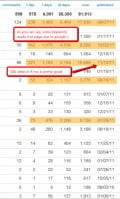Creating the Perfect Article: Keyword Content and Presentation
Content must be refreshing long and reader friendly
Here are some tips to beat the competition.
- Write topic specific matter
- Present ideas in neat fashion
- Use keywords aptly
Article content creation
Do you like picking cherries from the tree? Or counting stars at night? Keywords form essence of an article. Presentation and content depend on this keyword selection. Most people like to pick out the essence of anything, food, music, painting, or literature. This second nature of man, admiration varies with person and with item under scrutiny. But mostly, it dominates all things in life. That is why keywords are important, more than presentation or content.
Setting the pace

Rushing through article writing
Have you seen an express train rushing through past the countryside? You only get a glimpse of its outline and the rattle and clickety clack of its wheels and then it is gone. Many articles are like that – elephant has four legs, one tail, one trunk and one big head. End of matter – there is no detail regarding its genealogy, its feeding habits, its habitat or even its color. Content can vary – it may be little as little as 200 to 250 words. Or it may be a massive elephant stretching to 1000 or 1500 words. I read one article that said there were two elephants walking side by side. Then it went on to tell the reader that they were playing and walked for half an hour. There was no detail regarding their tails, ears, huge body or peculiar walking style. It might have been two cats as well.
Presentation can be in the form of prose, poetry or ballad. Many authors change the content from ballad form to prose presentation and vice versa. Search engines like Bing, Yahoo and Google want new content every day. Internet is filled with people who are constantly churning our article and only those that rank above others will have more visitors or readership. Writers must take time to make content searchable by engines and crawler bots. This means including keywords in titles, subtitles and throughout the article.
Importance of content

Grouping content with clarity: Presentation
Keyword is the headlight on your vehicle. It tells you which direction your article is going. Without these headlights you might as well dance in the dark and create loads of confusion for your readers. If you are talking about car tires you have to deal with different brands Ceat, Firestone, and MRF, talk about the different models such as regular tires, racing tires, all terrain tires and tires for special vehicles. You also have to stress upon the differences there are between different models the types of material steel web reinforced outers, webbed structure for gripping the road as well as well as plastic reinforcement that help the tire to wear well. Keywords will be tire types, tire brands, material for tires, racing tires, regular tires and so on. If your article is perhaps missing out some important part – say suitability of tires to roads – and there is some other article that has mentioned this point, then that article will be graded at a higher level compared to yours. Search engines will find that article first before it finds yours.
Readership and Article writing
Mistakes in usage
Perhaps the worst case of literary abuse can be found in those articles where an author disregards proper usage of words. He or she just uses whatever they feel like – in many cases presenting a meaning that is contrary to the topic. Take the case of:
a) Cannot and will not: The committee cannot distribute sweets tomorrow. The committee will not distribute sweets tomorrow. In both cases, the meaning is the same – namely you need not go since you will not get sweets and never mind how you feel about the committee. Which is the one to use? In the first case, something or someone is preventing the committee from distributing sweets. In the second case, nothing is stopping the committee but they have decided not to give sweets. Using these two terms in an interchanged position will not convey the full meaning.
b) Which, that and who: There is huge confusion over the usage of these three words. First, who will come only when you relate it to someone doing the action or related to the subject. Here we are not dealing with simple usage such as asking a question “Who is in the house?” We are dealing with indicative pronoun usage. “The boy, who is wearing the blue shirt, is my nephew”. ‘Which’ is usually used to indicate lifeless objects and inanimate things. When there is no need to specify a connection ‘that’ will be used. For example, “My son takes a box that is made of aluminum”. “We will wait to see which one will come first”.
c) Than – then: This usage is clear to most writers yet some overlook it when in a hurry. “Than’ is used in a comparative context while ‘then’ is a preposition that is used conditionally. If it rains, then I will carry my umbrella.
Article writing

Maintain reader interest
- Use bullet points
- Write only on topic
- Break article into small readable pieces
Content should hold reader interest
At the outset, stick to plan. The reader should always be with you and must appreciate what you are trying to say. Cut idea into points and filter out unwanted things. It is best selling technique.
I. Use incidents and anecdotes: Say you were talk about advantages of traveling by train compared to traveling by bus within the city. If you merely mention the advantages and disadvantages, it might be interesting. However, if you were to quote an incident where a friend of yours challenged you to a race across town using the metro rail and bus, it would be thrilling.
II. Avoid using past tense: Write only in present tense. When you slip into past tense, readers lose interest. This is a thumb rule and a very good one at that.
III. Ask questions to the reader: Why do we write articles? If everyone is writing, who is reading them? To be sure, the present and future belongs to article writers. Those who can and will write will always have work and good pay. Internet has created a vast ocean of demand for those who can write articles. When you can ask questions, you can create interesting articles.









